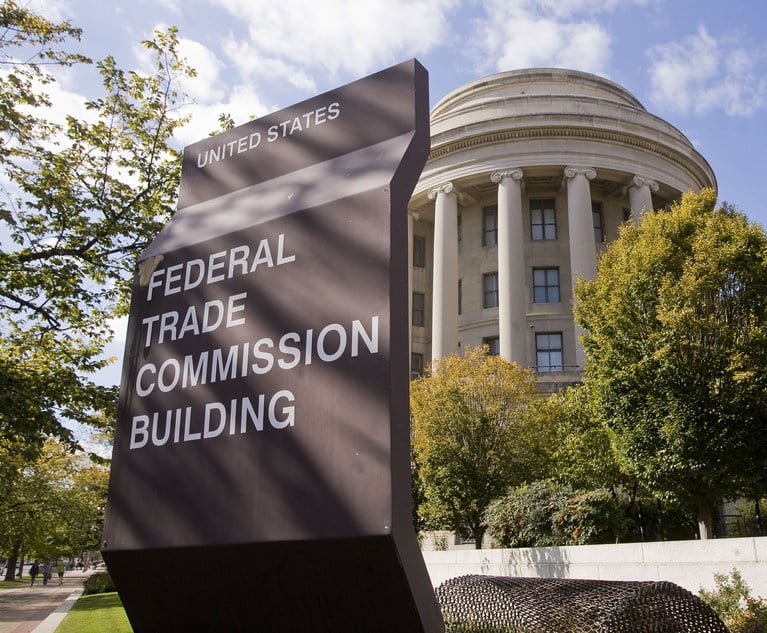Fish & Richardson Wins New Trial on Fabric Design Patent
The Federal Circuit says a jury should have evaluated the competing designs, even if a primary difference was one company's logo. But the appellate court sidestepped a damages question left open by the Supreme Court's Samsung v. Apple ruling.
November 13, 2019 at 06:59 PM
3 minute read
 U.S. Court of Appeals for the Federal Circuit in Washington, D.C. Photo: Mike Scarcella/ALM.
U.S. Court of Appeals for the Federal Circuit in Washington, D.C. Photo: Mike Scarcella/ALM.
Seirus Innovative Accessories Inc.'s logo just became worth $3 million.
It's not because of any inherent marketing value. It's because the company's practice of inserting the logo box into its wavy design for heat reflective material was enough to defeat summary judgment for infringement of a competitor's patented design.
Judge Alan Lourie of the U.S. Court of Appeals for the Federal Circuit acknowledged Wednesday that the court has previously held that an infringer can't automatically defeat design patent liability simply by adding a label to a copied design. But that precedent "does not prohibit the fact finder from considering an ornamental logo, its placement, and its appearance as one among other potential differences between a patented design and an accused one," the judge wrote in Columbia Sportswear v. Seirus Innovative Accessories.
The upshot is that Seirus will get a new trial before U.S. District Judge Marco Hernandez of the District of Oregon, handing a win to its Fish & Richardson counsel.
Columbia patented a design for its Omni-Heat linings that can insulate jackets, boots, gloves, hats, pants, sleeping bags and tents. Seirus markets a competing "HeatWave" product that features a similar wavy pattern, though Seirus argues that its waves vary in spacing and size, and are interrupted by repeated appearances of the Seirus logo.
Hernandez ruled as a matter of law that Seirus' design infringes. The differences in the designs are "so minor as to be nearly imperceptible" to an ordinary observer, the judge wrote. And it's "well-settled that a defendant cannot avoid infringement by merely affixing its logo to an otherwise infringing design," he added, citing the Federal Circuit's L.A. Gear v. Thom McAn Shoe.
Lourie and Federal Circuit Judges Kimberly Moore and Kara Stoll disagreed. "The district court's piecemeal approach, considering only if design elements independently affect the overall visual impression that the designs are similar, is at odds with our case law requiring the fact-finder to analyze the design as a whole," Lourie wrote. On remand, a jury should resolve the disputed facts about the design, he added.
The court sidestepped a hot-button issue in the case: whether Columbia can recover profits on all of the infringing HeatWave products, or whether the infringing "article of manufacture" is only the fabric that bears the design. District courts are still working out how to determine the article of manufacture following the Supreme Court's 2016 ruling in Samsung v. Apple.
The Federal Circuit further held that Hernandez was within his discretion to move the trial to the Southern District of California in the wake of the Supreme Court's TC Heartland v. Kraft Foods Group Brands ruling on patent venue.
San Diego Fish & Richardson partner Seth Sproul argued the appeal for Seirus. Columbia was represented by Schwabe, Williamson & Wyatt in Portland, Oregon.
This content has been archived. It is available through our partners, LexisNexis® and Bloomberg Law.
To view this content, please continue to their sites.
Not a Lexis Subscriber?
Subscribe Now
Not a Bloomberg Law Subscriber?
Subscribe Now
NOT FOR REPRINT
© 2024 ALM Global, LLC, All Rights Reserved. Request academic re-use from www.copyright.com. All other uses, submit a request to [email protected]. For more information visit Asset & Logo Licensing.
You Might Like
View All
$10M John Deere Bribery Settlement Underscores Risks of Not Integrating Acquisitions

Natalie Black Kohler, Legal Chief of Bath-Fixture Giant for 26 Years, Dies at 74
3 minute read
'Strong' Legal Theory or 'Oxymoron'? Experts Eye FTC Antitrust Suit Against Mattress Merger
5 minute read
Child Labor Probe Hammers Tennessee Factory, Highlighting Risks to Employers From Feds' Stepped-Up Enforcement
6 minute readLaw Firms Mentioned
Trending Stories
- 1'Largest Retail Data Breach in History'? Hot Topic and Affiliated Brands Sued for Alleged Failure to Prevent Data Breach Linked to Snowflake Software
- 2Former President of New York State Bar, and the New York Bar Foundation, Dies As He Entered 70th Year as Attorney
- 3Legal Advocates in Uproar Upon Release of Footage Showing CO's Beat Black Inmate Before His Death
- 4Longtime Baker & Hostetler Partner, Former White House Counsel David Rivkin Dies at 68
- 5Court System Seeks Public Comment on E-Filing for Annual Report
Who Got The Work
Michael G. Bongiorno, Andrew Scott Dulberg and Elizabeth E. Driscoll from Wilmer Cutler Pickering Hale and Dorr have stepped in to represent Symbotic Inc., an A.I.-enabled technology platform that focuses on increasing supply chain efficiency, and other defendants in a pending shareholder derivative lawsuit. The case, filed Oct. 2 in Massachusetts District Court by the Brown Law Firm on behalf of Stephen Austen, accuses certain officers and directors of misleading investors in regard to Symbotic's potential for margin growth by failing to disclose that the company was not equipped to timely deploy its systems or manage expenses through project delays. The case, assigned to U.S. District Judge Nathaniel M. Gorton, is 1:24-cv-12522, Austen v. Cohen et al.
Who Got The Work
Edmund Polubinski and Marie Killmond of Davis Polk & Wardwell have entered appearances for data platform software development company MongoDB and other defendants in a pending shareholder derivative lawsuit. The action, filed Oct. 7 in New York Southern District Court by the Brown Law Firm, accuses the company's directors and/or officers of falsely expressing confidence in the company’s restructuring of its sales incentive plan and downplaying the severity of decreases in its upfront commitments. The case is 1:24-cv-07594, Roy v. Ittycheria et al.
Who Got The Work
Amy O. Bruchs and Kurt F. Ellison of Michael Best & Friedrich have entered appearances for Epic Systems Corp. in a pending employment discrimination lawsuit. The suit was filed Sept. 7 in Wisconsin Western District Court by Levine Eisberner LLC and Siri & Glimstad on behalf of a project manager who claims that he was wrongfully terminated after applying for a religious exemption to the defendant's COVID-19 vaccine mandate. The case, assigned to U.S. Magistrate Judge Anita Marie Boor, is 3:24-cv-00630, Secker, Nathan v. Epic Systems Corporation.
Who Got The Work
David X. Sullivan, Thomas J. Finn and Gregory A. Hall from McCarter & English have entered appearances for Sunrun Installation Services in a pending civil rights lawsuit. The complaint was filed Sept. 4 in Connecticut District Court by attorney Robert M. Berke on behalf of former employee George Edward Steins, who was arrested and charged with employing an unregistered home improvement salesperson. The complaint alleges that had Sunrun informed the Connecticut Department of Consumer Protection that the plaintiff's employment had ended in 2017 and that he no longer held Sunrun's home improvement contractor license, he would not have been hit with charges, which were dismissed in May 2024. The case, assigned to U.S. District Judge Jeffrey A. Meyer, is 3:24-cv-01423, Steins v. Sunrun, Inc. et al.
Who Got The Work
Greenberg Traurig shareholder Joshua L. Raskin has entered an appearance for boohoo.com UK Ltd. in a pending patent infringement lawsuit. The suit, filed Sept. 3 in Texas Eastern District Court by Rozier Hardt McDonough on behalf of Alto Dynamics, asserts five patents related to an online shopping platform. The case, assigned to U.S. District Judge Rodney Gilstrap, is 2:24-cv-00719, Alto Dynamics, LLC v. boohoo.com UK Limited.
Featured Firms
Law Offices of Gary Martin Hays & Associates, P.C.
(470) 294-1674
Law Offices of Mark E. Salomone
(857) 444-6468
Smith & Hassler
(713) 739-1250










